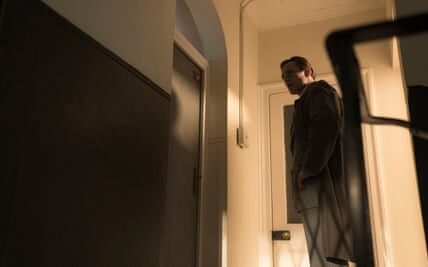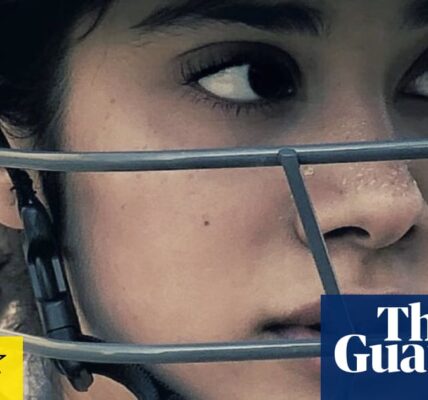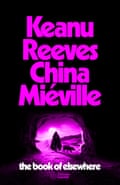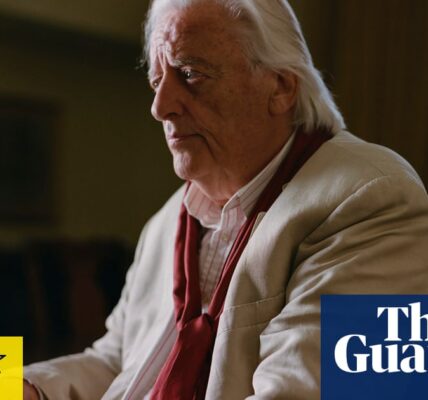‘I don’t want it to be like Marvel’: the Netflix superhero drama swapping spandex for south London
This is a superhero origin story. That is, the story of Andrew “Rapman” Onwubolu’s triumphant round-trip from south London to Hollywood and back again. Supacell, Rapman’s epic sci-fi fantasy series, which lands on Netflix this week is something subtly different: “I call it a superpower story,” says Rapman – “Raps” to his friends – with a relaxed grin. “Everyone is out for themselves. They’re very much flawed, ordinary individuals. No one’s got capes on. No one’s trying to save the world.”
Like Rapman’s 2019 box office breakthrough, Blue Story – Lewisham’s answer to West Side Story – or the irresistibly soapy tale of badman betrayal that is 2018 YouTube series Shiro’s Story, Supacell has a Black-majority cast and a south-east London setting. Unlike those previous hits, this series forgoes the film-maker’s trademark rap narration and features characters who can do things like teleport. Or turn invisible. Or move objects with their minds. Even so, realism of a kind was important: “If me or you get powers, would the first thing we’d do be to stop a bridge falling in China? Probably not. We’re probably going to figure out how to use this to advance ourselves and our families.”
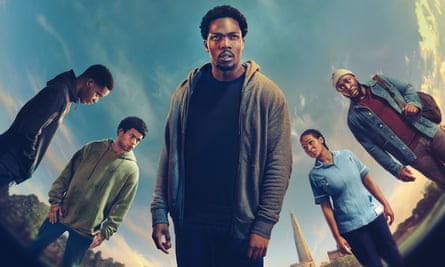
Supacell brings us into a world that might be fantastical, but which is also very familiar. Characters range from delivery van driver Michael (Tosin Cole) and struggling single dad Andre (Eric Kofi-Abrefa) to small-time weed dealer Rodney (Calvin Demba), coldly ambitious gang leader Tazer (Josh Tedeku) and responsible, slightly repressed nurse Sabrina (Nadine Mills). At first, the five use their newly discovered powers for their own petty ends – to get out of a jam, or get back at a two-timing ex – but as the mysterious source of their powers is revealed, the five realise how high the stakes really are, and that they’ll need to work together to survive.
Growing up in the London borough of Lewisham during the mid-00s uptick in street violence known as the “postcode wars”, the closest thing young Raps had to a superpower was his natural flair for storytelling. He sets the scene: “A rival gang would come to the area and do something crazy, and then the next day everyone that wasn’t there would be like, ‘Yo, what happened?!’” At this point, if any other wannabe raconteur stepped up, they were quickly dismissed. “Like, ‘Nah, just let Rapman tell it, please. I beg you …’ Because I’d throw a little sauce in there. That was always my moment; to tell the story of what went down yesterday.”
This evolved into writing screenplays and making short films to put online – all without any particular career plan in mind. “I didn’t even know film schools existed … But I loved storytelling so much, and I knew I could put things on YouTube, so I just started doing the YouTube thing, YouTubing and YouTubing. And then, eventually, I started getting popular.”
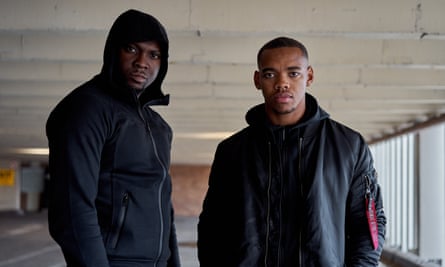
That’s an understatement. The third and final instalment of Shiro’s Story passed a million views in just five hours. The series has, to date, amassed over 33m views. Jay-Z took note and signed Rapman to Roc Nation in 2018. Rapman has spoken previously about soaking in the legendary rap mogul’s business wisdom during their first in-person meeting that year (“He was dropping bare gems on me,” he told Capital FM. “[He said] people think you’ve got to be in a position of power to authoritate power, but that’s not how it is; your power is inside of you.”) Then, in 2019, Blue Story recouped its £1.3m budget nearly four times over, despite being pulled from UK screens by two major cinema chains over a brawl at a Birmingham cinema which, it later turned out, may have originated in a Frozen II screening anyway.
By 2020, Rapman was being wooed by Hollywood, a uniquely head-spinning experience. “I had studios sending me like three scripts a day.” To the consternation of some day-one fans, he settled on an English-language remake of Jacques Audiard’s critically acclaimed prison-gang thriller A Prophet as his next project. “I wasn’t gonna do it at first. Like I’ve got so many original stories … Then they flew my family out to Disney World. I was like, ‘Woah … Disney World?!’.”
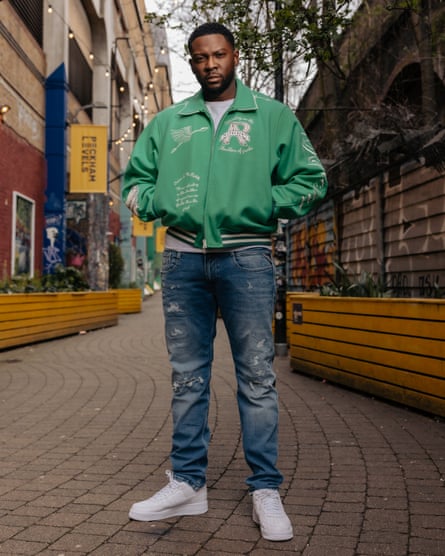
Variety reported on the deal in early 2020, with Russell Crowe attached to star, but after a year of hard work, Rapman received word it had been canned. “Covid scared them … they said they’d got a backlog of movies.” Despite his initial reservations, this was a blow. “Honestly, I felt like I’d lost all wind out of my belly. And then the producer, in the nicest way possible, said, ‘Look, cuz, that’s Hollywood’.”
That is Hollywood. The road to opening weekend is littered with broken contracts, unmade opuses and never-ending delays. A more seasoned industry insider might have shrugged it off, but Rapman didn’t come up the traditional way and, consequently, he does things differently. “I’d already done the deal for Supacell while I was working on the Prophet and I remember saying, ‘There is no way in the world I’m losing two green lights in a row’.” At this point, Rapman disbanded the writers’ room that Netflix had put together for Supacell – “It just weren’t working” – and opted to write every episode himself. “So, if people love Supacell, I can put my hands up and say ‘Thank you, that was me.’ And if people hate it, I can’t say, ‘Well, Netflix made me … ’ I can’t. I have to hold that as well.”
This is the superpowered self-reliance that in outsider status can create. Having no formal training or family connections has allowed Rapman to develop a storytelling style that – thanks to YouTube’s instant feedback – is intuitively insync with his audience, and – thanks to Jay-Z’s advice – impervious to the whims of studio executives. Does he ever feel the hand of fate at work? “Yeah, I do, in a way. I feel like if I don’t do it, who will? If I don’t leave the UK something that’s gonna see us in a bigger light, who will do it?”
And now he’s done it. Supacell pulls off that elusive balance of realism and escapism, not just excelling at the reality of Black British London life, but featuring enough epic-scale action and slick visuals and dramatic cliffhangers to draw in an international crowd. Climactic scenes may use iconic London landmarks – there’s an inter-dimensional battle at an eerily traffic-free Piccadilly Circus, and a tense gangland negotiation outside Greenwich’s Old Royal Naval College – but always with a relatable, human context. Meanwhile there’s a grime and drill soundtrack handpicked by Rapman, and first-time serious acting roles for London rappers Ghetts and Digga D. If Top Boy put Black Britain on TV’s world map, Supacell is expanding the boundaries of that territory.
This is something actor Tosin Cole can appreciate. “I was [reading the script] turning the pages and I was like, I know people like that,” says Cole, who plays Michael, a main character whose strange, premonitory vision of flame-ball throwing hooded figures in a dystopian cityscape sets the action in motion. Cole was born in New York before moving to south London aged eight and is a transatlantic talent, with a CV ranging from playing a Resistance starfighter pilot in Star Wars: The Force Awakens to one of Jules’s working-class party pals in Joanna Hogg’s The Souvenir. After so many roles requiring an American accent, Supacell feels like a homecoming: “I mean, Raps, just being from around the way, even when he’s given me a note, it’ll be like the most south London note ever. Like, ‘Brudda! Y’geddit?’ And I’ll be like ‘Yes, I understand every single thing you just said.’”
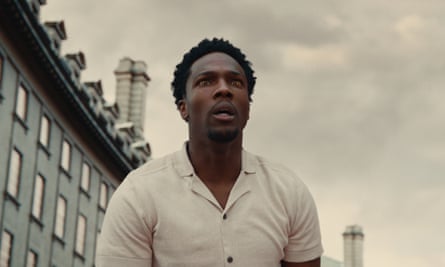
Rapman, 35, says he based Cole’s delivery van driver character on his own alternative life path – the way his life might have gone, had the film and TV making not worked out – while ruthless gang leader Tazer (Tedeku), who can render himself invisible at will, is a version of his younger self: “All my friends that grew up with me in the Tazer world became van drivers. They make good money as well, so it was important to me that they didn’t look as if they weren’t earning.” These days though, he relates more to the conscientious single-dad character, Andre. Which is why any slang in the script has been left to the younger cast members: “If I wrote a dead word, the actor who plays Twosie [Andy Thompson] would be like, ‘Eh Raps, man, this word here man … Like, bruvva, no one don’t say that, y’know?’. They will throw it in and I’ll let them keep it, if it makes sense.”
The quality dialogue also appealed to Adelayo Adedayo, who plays Michael’s girlfriend Dionne. In particular, the way it subtly integrates themes that affect Black people’s lives – from “missing white woman syndrome” to medical racism. “There’s a bit where they’re watching a version of Love Island, and my character references the way Black women are treated on reality shows.” It struck her as a demonstration of Rapman’s skill and sensitivity. “Just in that little, small line, you can see [the importance of] what Raps has done.”
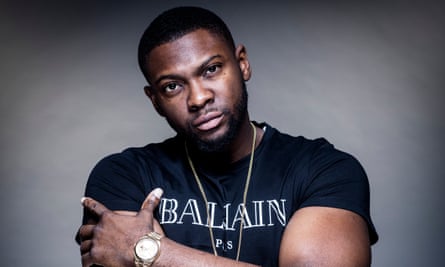
Such pop culture commentary comes easily to someone of Rapman’s voracious viewing habits. “Remember, I watch everything. That’s how I learned to do what I do.” He also wrote the character of cockney wide boy Rodney with actor Calvin Demba in mind, after spotting him in the Alison Steadman-starring BBC drama Life. “That was a great big compliment!” says a delighted Demba. “And I definitely did see some similarities with Rodney, like his general patter and we’re both useless at business.”
Rapman may watch BBC dramas, but he didn’t want Supacell to look like one. “Y’know, it’s grey, it’s British … it’s nice, but I wanted this to be, if you’re walking past the TV on mute, you’re not sure what country it’s filmed in.” To that end, together with director of photography Aaron Reid and the visual effectsteam, he spent weeks carefully devising a polished-but-plausible look that would, by virtue of its London realness, stand out in the superhero-saturated entertainment landscape: “I don’t want the powers to be too exaggerated, like we were trying to be Marvel” – while also eschewing the “UK rules” he’s seen hamper his contemporaries. “They don’t want to think too big, in case it doesn’t get made. Whereas I’ve always been like, think big. Then someone will have to come big to make it, y’know?”
This has required Rapman to come big in turn, by stepping into the demanding role of writer-director-showrunner. “Put it this way, there’s no movie that could scare me after doing Supacell. I was telling my agent the other day, ‘Send the $200m budget movies. I’m ready to go, man.’” And on this evidence, he’s already flying.
-
Supacell is on Netflix from 27 June
Source: theguardian.com
